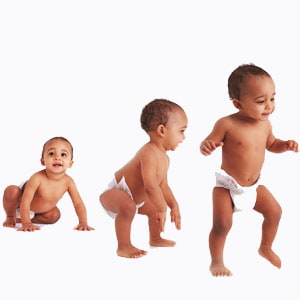It’s your daughter’s first birthday, and she still can’t toddle from her grandmother’s side to her cake. Your son is 18 months old, and shows no interest in sketching his first masterpiece. Your child isn’t speaking, and her fellow toddlers are talking up a storm. When your child isn’t hitting milestones “on time”, the frustration and worry can overtake new parents. But “typical” is often a fairly loose term.
Gross Motor Skills
“Is he walking yet?” That’s the first question every parent gets about their young child’s development, around the time of his first birthday. When other kids are tottering around at the playground, and your child is sitting firmly on his rear end in the sandbox, it can be worrisome. But the University of Missouri-Columbia released a study which showed that 90% of babies crawl between 5 and 11 months, and walk between 9 and 17 months. So when your 15 month old is still scuttling everywhere on all fours, take it easy and give it a month or two. Ask your daycare provider for tips and reassurance. We have seen and worked with hundreds of children in the same situation. We will assist him in pulling up as often as possible, and will be sure to report on his progress.
Fine Motor Development
Many kids are holding crayons, markers, and pencils at a year of age, but not all. The same study mentioned above shows that many babies may not color wit crayons until 21 months, closer to their second birthday. And they may not stack two blocks until 19 months. So don’t fear if your child is more interested in climbing all over the living room than handling small objects with precision. If your child hasn’t mastered, or at least tried, the pincer grasp at a year of age, bring it up with his pediatrician. But remember that even if he needs help in order to push forward, many therapists are highly effective at getting young kids to get up to speed.
Speech Development
Most children do say their first words by age 1, and will link words together into short phrases by the age of two. But there are, of course, children who remain curiously quiet well into their toddlerhood. Speech is complex, requiring mental, emotional, and physical factors to work together to produce progress. Your child may simply need more time to speak up, and many kids simply don’t have a chatty temperament. Most of these kids eventually speak clearly in complicated sentences and continue to develop their skills throughout childhood. Regardless, if you are worried, speech therapists can often work with a child’s unique needs and personality to move the process along.
It can be nerve-wracking to watch other kids run rings around yours, sometimes literally, when it comes to development. But just remember that kids develop in different areas at different speeds, and most delays are resolved in time. Plus, seeking professional intervention can produce results quickly, laying your fears to rest.

